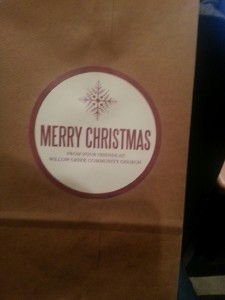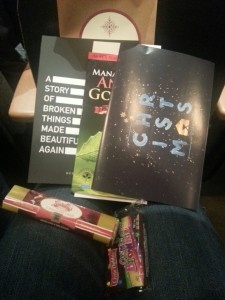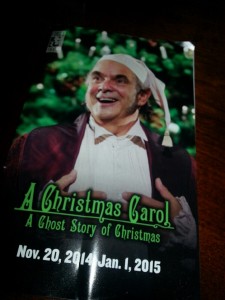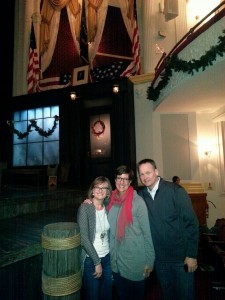Do you every feel as though God is trying to teach you something through events that seem to have a shared core? That happened to me last week.
Last weekend I went to a suburb of Chicago to help my son, Karsten, look for an apartment close to his work. On Sunday we went to Willowcreek Community Church in Barrington. The teaching that week was about carry for those in prison. Bill Hybels message stressed that no one is beyond hope. At the end of the service we packed 32,000 bags, between all the services, with books and snacks for the prisoners in Illinois.



On Monday I flew to Dulles Airport i Washington DC to spend some time with long time friends of Neal’s and mine. Jim works for Prison Fellowship. Chuck Colson was founder of Prison Fellowship, Colson Center for Christian Worldvew and “Breakpoint” that aired on the radio. Colson served as Special Counsel to President Richard Nixon. Mr. Colson spent seven months in prison after pleading guilty to obstructing justice in the midst of Watergate. Prior to his inprisonment he gave his life to Christ. Following prison his radical life change led him to leading Prison Fellowship, the world’s largest outreach to prisoners, ex-prisoners and their families and the Colson Center, a teaching and training center focused on Christian worldview thought and application.
Tuesday night my friends and I went in to DC to see Charles Dicken’s “A Christmas Carol” in the historic Ford Theater where President Lincoln was shot. Scrooge with his Bah! Humbug! attidude encompasses all that dampens Christmas spirit: greed, indifference, selfishness and lack of consideration of other people. He was a penny-pinching miser who cared nothing for the people around him and mankind only existed for the money he could make of them through explotation and intimidation. He particularly detested Christmas which he viewed as “a time for finding yourself a year older, and not an hour richer.”


Scrooge is visited on Christmas Eve by the ghost of his former partner, Jacob Marley, who died seven Christmas Eve’s ago. Marley, a miser just like Scrooge, is suffering the consequences in the afterlife and hopes to help Scrooge avoid the same fate. He says, “I wesr the chain I forged in life…I made it link by link, and yard by yard. I gird it on my own free will, and of my own free will I wore it.” Marley tells Scrooge he will be haunted by three spirits: the ghosts of Christmas past, present and future.
Through these spirits visits, memory serves to remind Scrooge of a time when he still felt emotionally connected to other people, before he alienated himself from society. Empathy enables Scrooge to sympathize with and understand those less fortunate than himself, people like Tiny Tim and Bob Cratchit. His fear of death, used by the last spirit, helps the completion of Scrooge’s reformation. Christmas morning finds Ebenezer doing acts of kindness like sending a Christmas turkey and raising the salary of his long-suffering clerk , Bob Cratchit, spending Christmas day in the company of his nephew, Fred, whom he spurned in years past and helping Bob’s crippled son, Tiny Tim.
We sometimes find ourselves feeling imprisoned or in chains, like Bob Marley, of our own making because of choices we have made. Or maybe we are a victim of our circumstances beyond our control, like the poor in “A Christmas Carol.” Either can leave us with feelings of hopelessness.
Author Charles Dickens saw a need with the plight of poor children. In 1839 it was estimated that nearly half of all funerals in London were for children under the age of 10. Those who survived grew up with no education and virtually no chance ro escape poverty. Dickens felt this cycle could only be broken by educating the public, hence the writing of “A Christmas Carol.” Chuck Colson saw a need in the prisons and for ex-prisoners and their families and founded Prison Fellowship and The Colson Center. Willowcreek packed bags of supplies for prisoners to offer Christmas cheer.
What does Dickens, Colson and Willowcreek have in common? They wanted to offer hope to those imprisoned literally or in spirit. Charles Dickens said, “For it is good to be children sometimes, and never better than at Christmas, when its mighty Founder was a child himself.” During the Christmas season what a better time to remember the ultimate gift God gave by sending His son as an infant to offer hope to a broken world. Dickens, Colson and Willowcreek all showed compassion. Jesus showed compassion through tender sympathy to the poor, the despised, the hurt, and the sinful. No one was rejected or ignored by him. Christ payed the price for sin and opened the way to hope and peace with God.
What can I do to offer hope to a broken world? What can you do? This is what God did:
8-12 There were sheepherders camping in the neighborhood. They had set night watches over their sheep. Suddenly, God’s angel stood among them and God’s glory blazed around them. They were terrified. The angel said, “Don’t be afraid. I’m here to announce a great and joyful event that is meant for everybody, worldwide: A Savior has just been born in David’s town, a Savior who is Messiah and Master. This is what you’re to look for: a baby wrapped in a blanket and lying in a manger. 13-14 At once the angel was joined by a huge angelic choir singing God’s praises: Glory to God in the heavenly heights, Peace to all men and women on earth who please him. LUKE 2:8-14 MSG
Peace and hope to you this Christmas season.
On the journey,
Trish

